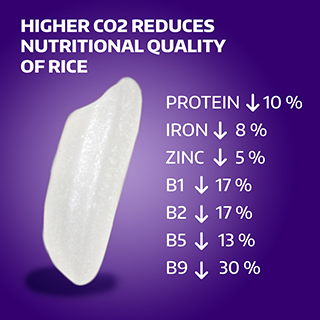Higher concentrations of carbon dioxide are associated with reductions in protein and multiple key nutrients in rice, according to a new field study by an international team that included scientists from the University of Washington School of Public Health.
The study, published today in Science Advances, shows for the first time that rice grown at concentrations of atmospheric CO2 expected by the end of this century has lower levels of four key B vitamins. The findings also support research from other field studies showing rice grown under higher CO2 concentrations has less protein, iron and zinc.

"Rice has been a dietary staple for thousands of years for many populations in Asia and is the fastest growing food staple in Africa," said co-author Kristie Ebi, director of the UW Center for Health and the Global Environment and professor of global health and environmental and occupational health sciences. "Reductions in the nutritional quality of rice could affect maternal and child health for millions of people."
Ebi's colleague Adam Drewnowski, director of the UW's Center for Public Health Nutrition program and a professor of epidemiology, also was a co-author. Read the press release.
The paper received global media coverage:
- How more carbon dioxide can make food less nutritious - The New York Times
- Rice, the staple food of billions, could become less nutritious because of climate change - Washington Post
- As the planet warms, we'll be having rice with a side of CO2 - NPR
- Carbon dioxide pollution is making rice less nutritious and could stunt growth in millions of children, finds study - Independent (UK)
- Global warming may have 'devastating' effects on rice - Jakarta Post, Hindustan Times, Philippine Star (via AFP)
- CO2 and rice - BBC Radio
